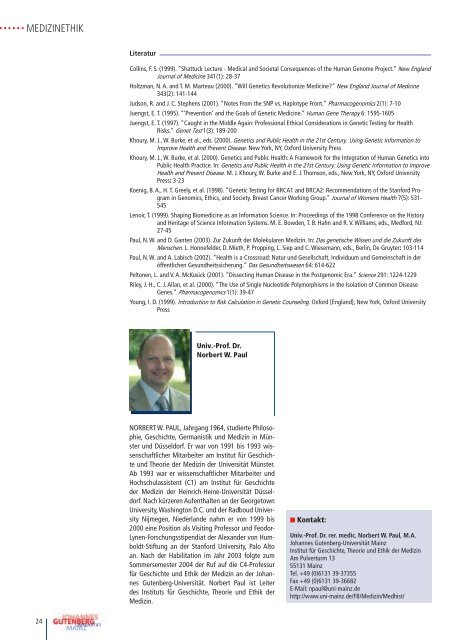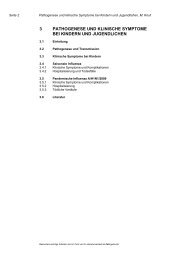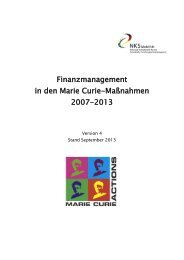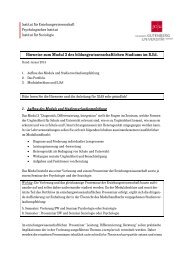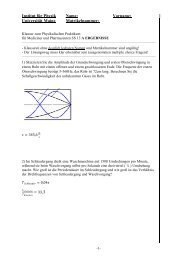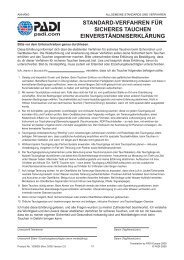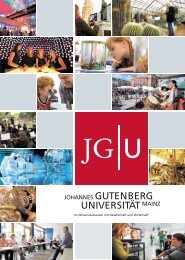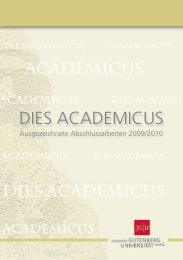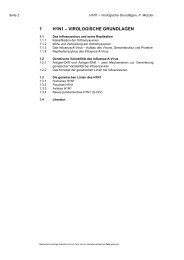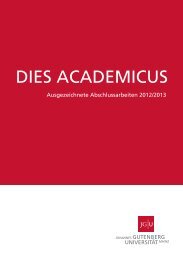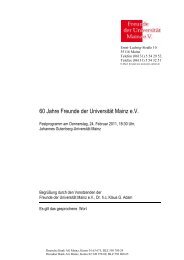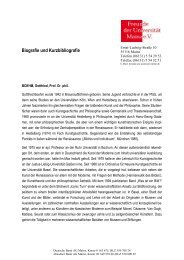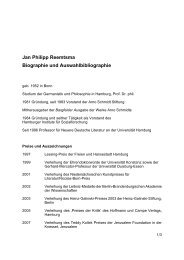Zwischen Memphis und Theben: Die Gräber politischer Drahtzieher
Zwischen Memphis und Theben: Die Gräber politischer Drahtzieher
Zwischen Memphis und Theben: Die Gräber politischer Drahtzieher
Erfolgreiche ePaper selbst erstellen
Machen Sie aus Ihren PDF Publikationen ein blätterbares Flipbook mit unserer einzigartigen Google optimierten e-Paper Software.
..... MEDIZINETHIK<br />
24<br />
Literatur<br />
Collins, F. S. (1999). “Shattuck Lecture - Medical and Societal Consequences of the Human Genome Project.” New England<br />
Journal of Medicine 341(1): 28-37<br />
Holtzman, N. A. and T. M. Marteau (2000). “Will Genetics Revolutionize Medicine?” New England Journal of Medicine<br />
343(2): 141-144<br />
Judson, R. and J. C. Stephens (2001). “Notes From the SNP vs. Haplotype Front.” Pharmacogenomics 2(1): 7-10<br />
Juengst, E. T. (1995). “‘Prevention’ and the Goals of Genetic Medicine.” Human Gene Therapy 6: 1595-1605<br />
Juengst, E. T. (1997). “Caught in the Middle Again: Professional Ethical Considerations in Genetic Testing for Health<br />
Risks.” Genet Test 1(3): 189-200<br />
Khoury, M. J., W. Burke, et al., eds. (2000). Genetics and Public Health in the 21st Century. Using Genetic Information to<br />
Improve Health and Prevent Disease. New York, NY, Oxford University Press<br />
Khoury, M. J., W. Burke, et al. (2000). Genetics and Public Health: A Framework for the Integration of Human Genetics into<br />
Public Health Practice. In: Genetics and Public Health in the 21st Century: Using Genetic Information to Improve<br />
Health and Prevent Disease. M. J. Khoury, W. Burke and E. J. Thomson, eds., New York, NY, Oxford University<br />
Press: 3-23<br />
Koenig, B. A., H. T. Greely, et al. (1998). “Genetic Testing for BRCA1 and BRCA2: Recommendations of the Stanford Program<br />
in Genomics, Ethics, and Society. Breast Cancer Working Group.” Journal of Womens Health 7(5): 531-<br />
545<br />
Lenoir, T. (1999). Shaping Biomedicine as an Information Science. In: Proceedings of the 1998 Conference on the History<br />
and Heritage of Science Information Systems. M. E. Bowden, T. B. Hahn and R. V. Williams, eds., Medford, NJ:<br />
27-45<br />
Paul, N. W. and D. Ganten (2003). Zur Zukunft der Molekularen Medizin. In: Das genetische Wissen <strong>und</strong> die Zukunft des<br />
Menschen.L.Honnefelder, D. Mieth, P. Propping, L. Siep and C. Wiesemann, eds., Berlin, De Gruyter: 103-114<br />
Paul, N. W. and A. Labisch (2002). “Health is a Crossroad: Natur <strong>und</strong> Gesellschaft, Individuum <strong>und</strong> Gemeinschaft in der<br />
öffentlichen Ges<strong>und</strong>heitssicherung.” Das Ges<strong>und</strong>heitswesen 64: 614-622<br />
Peltonen, L. and V. A. McKusick (2001). “Dissecting Human Disease in the Postgenomic Era.” Science 291: 1224-1229<br />
Riley, J. H., C. J. Allan, et al. (2000). “The Use of Single Nucleotide Polymorphisms in the Isolation of Common Disease<br />
Genes.” Pharmacogenomics 1(1): 39-47<br />
Young, I. D. (1999). Introduction to Risk Calculation in Genetic Counseling. Oxford [England]; New York, Oxford University<br />
Press<br />
Univ.-Prof. Dr.<br />
Norbert W. Paul<br />
NORBERT W. PAUL, Jahrgang 1964, studierte Philosophie,<br />
Geschichte, Germanistik <strong>und</strong> Medizin in Münster<br />
<strong>und</strong> Düsseldorf. Er war von 1991 bis 1993 wissenschaftlicher<br />
Mitarbeiter am Institut für Geschichte<br />
<strong>und</strong> Theorie der Medizin der Universität Münster.<br />
Ab 1993 war er wissenschaftlicher Mitarbeiter <strong>und</strong><br />
Hochschulassistent (C1) am Institut für Geschichte<br />
der Medizin der Heinrich-Heine-Universität Düsseldorf.<br />
Nach kürzeren Aufenthalten an der Georgetown<br />
University, Washington D.C. <strong>und</strong> der Radboud University<br />
Nijmegen, Niederlande nahm er von 1999 bis<br />
2000 eine Position als Visiting Professor <strong>und</strong> Feodor-<br />
Lynen-Forschungsstipendiat der Alexander von Humboldt-Stiftung<br />
an der Stanford University, Palo Alto<br />
an. Nach der Habilitation im Jahr 2003 folgte zum<br />
Sommersemester 2004 der Ruf auf die C4-Professur<br />
für Geschichte <strong>und</strong> Ethik der Medizin an der Johannes<br />
Gutenberg-Universität. Norbert Paul ist Leiter<br />
des Instituts für Geschichte, Theorie <strong>und</strong> Ethik der<br />
Medizin.<br />
■ Kontakt:<br />
Univ.-Prof. Dr. rer. medic. Norbert W. Paul, M.A.<br />
Johannes Gutenberg-Universität Mainz<br />
Institut für Geschichte, Theorie <strong>und</strong> Ethik der Medizin<br />
Am Pulverturm 13<br />
55131 Mainz<br />
Tel. +49 (0)6131 39-37355<br />
Fax +49 (0)6131 39-36682<br />
E-Mail: npaul@uni-mainz.de<br />
http://www.uni-mainz.de/FB/Medizin/Medhist/


